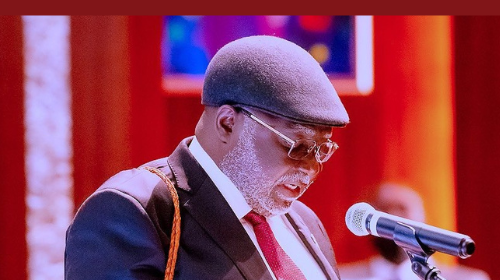
Justice Olukayode Ariwoola’s emergence as the acting Chief Justice of Nigeria has stirred calls for long-awaited reforms in the nation’s judiciary, writes TOPE OMOGBOLAGUN
Acting Chief Justice of Nigeria, Justice Olukayode Ariwoola, became the highest-ranking judicial officer when his predecessor, Justice Tanko Muhammad (retd.), prematurely retired on health grounds. But that was barely two weeks after 14 Justices of the Supreme Court raised a petition on damning allegations of corruption against Muhammad.
The aggrieved Justices included Ariwoola, Justice Musa Mohammed, Justice Kudirat Kekere-Ekun, Justice John Okoro, Justice Chima Nweze, Justice Amina Augie, and Justice Uwani Abba-Aji.
Others were Justice Mohammed Garba; Justice Helen Ogunwumiju, Justice Ibrahim Saulawa, Justice Adamu Jauro, Justice Tijjani Abubakar, and Justice Emmanuel Agim.
In the memo, the apex court Justices accused the former CJN of non-payment of their legitimate entitlements. They also lamented their poor working conditions, exemplified by epileptic power supply, lack of Internet connectivity and so on.
In the leaked memo that astounded many Nigerians, they said, “We are serving this country diligently and to the best of our ability. We resolve disputes between the executive and the legislature including all manner of disagreements, between governments and individuals.
“It would be a tragedy if the Nigerian public were to know that we are unable to resolve our own problems internally without going public. The decision to write to you formally must be seen by Your Lordship as an effort on our part to preserve the dignity of the judiciary and the respect accorded to us by the governments and people of Nigeria.” Furthermore, the aggrieved Justices asked the former CJN to be alive to his responsibilities and expressed fears of a possible shutdown of the judiciary due to the concerns raised in the memo.
The Justices drew Muhammad’s attention to an internal memo served by the chief registrar, notifying Justices that electricity would only be supplied to the Supreme Court between 8am and 4pm daily, due to the lack of diesel, a condition they found unpalatable and undeserving of the apex court in the country.
They said, “The implication of this memo is that the Justices must finish their work and close before 4pm. Your Lordship, with all due respect, this is the peak of the degeneration of the court; it is the height of decadence and clear evidence of the absence of probity and moral rectitude.
“Your Lordship occupies a position of leadership. We will not wait for the total collapse of the institution. Your Lordship, this act alone portends imminent danger to the survival of this court and the judiciary as an institution, which is gradually drifting to extinction. Your Lordship, this is a wake-up call.”
In response, Muhammad denied any wrongdoing, saying the leaked memo was tantamount to the apex court “dancing naked at the market square”.
But already the unprecedented outburst by the conservative Justices of the Supreme Court had set tongues wagging. The Senate immediately waded in and asked that its Committee on Judiciary, Human Right and Legal Matters to step in to probe the issues. Some civil society organisations demanded the investigation of tangential fraud allegations levelled by the protesting Justices against the then CJN.
It was in the middle of the storm that Muhammad tendered his resignation, citing ill health, and stepped down from the exalted seat.
Muhammad left 18 months ahead of his retirement, which was billed for December 2023 when he would clock 70 years.
Enters Ariwoola
Following Muhammad’s exit, Buhari on June 27, 2022 swore in Ariwoola as the acting CJN.
The manner of Ariwoola’s emergence as acting CJN mirrors in some ways, how Muhammad himself assumed the highest judicial seat in January 2019.
Muhammad’s emergence as acting CJN in January 2019 followed the suspension of his predecessor, retired Justice Walter Onnoghen, by the President, Major General Muhammadu Buhari (retd.), over allegations of corruption.
Muhammad was appointed in acting capacity, pending the determination of the corruption allegations against Onnoghen before the Code of Conduct Tribunal.
Onnoghen, who was convicted by the CCT, never returned to the seat and Muhammad subsequently became the substantive CJN.
While Onnoghen was forced out amid ranging corruption allegation, Muhammed, on his part, resigned just as calls for probity thickens after accusation of maladministration and corruption by his colleagues.
Following his resignation, the Human Rights Writers Association of Nigeria called on anti-graft agencies to probe Muhammad for corruption on the basis of the allegations raised by his apex court Justices.
“The resignation of Justice Tanko Muhammad as the Chief Justice of Nigeria is not enough; the EFCC and the ICPC must swing into action, investigate, then if a cause of action is ascertained, then arrest and prosecute him over the corruption allegations levelled against him by the 14 Justices of the Supreme Court if a prima facie evidence exists.
“Justice Tanko must be prosecuted just as his predecessor, Walter Onnoghen, who was probed and later removed on a controversial note following some allegations against him which was probed by both the NJC and the CCT.
“The investigation and probable prosecution of Tanko, if indicted, will set a precedent that Buhari’s anti-corruption crusade is not a joke unless it is a joke,” HURIWA said in a statement by its National Coordinator, Emmanuel Onwubiko.
A Senior Advocate of Nigeria, Mr Femi Falana, told Sunday PUNCH, in an interview, that the troubling development at the Supreme Court, including allegation of corruption against the ex-CJN, “is a confirmation of the collapse” of the nation under Buhari’s watch.
Falana said the intervention of the Senate Committee on Judiciary, Human Right and Legal Matters would not be meaningful without interrogating the culture of passing the budget of the judiciary without highlighting its details.
“That is a breach of the constitution, which should stop without any further delay. It is hoped that the intervention of the Senate Judiciary Committee under the leadership of Senator Opeyemi Bamidele will address the serious lacuna. The National Assembly should ensure that the details of the budget of the judiciary are set out in the budget prepared and submitted for the consideration of the legislators. Otherwise, the National Assembly is not in a position to appreciate whether the N110bn earmarked for the judiciary is sufficient or not.” Falana said.
In his response to the allegations raised by the protesting apex court Justices, Muhammad had said, “The Supreme Court definitely does not exist outside its environment; it is also affected by the economic and socio-political climate prevailing in the country.”
Defending himself on the allegation that the Supreme Court Justices were deprived of resources and an enabling environment to work, including electricity supply and Internet connectivity, the ex-CJN said, “The Federal Government releases the budget based on the budget components. And it’s an offence to spend the money meant for one item for another.”
With Muhammad’s exit, all eyes are on his successor, Ariwoola, to right all the wrongs bedeviling the judiciary.
Ariwoola, an indigene of Iseyin in Oyo State, had before his appointment to the apex court bench, served as a Justice of the Court of Appeal between 2005 and 2011.
Stakeholders in the judiciary believe his appointment came at a time when this arm of government needed to stay true to its constitutional responsibilities.
Like a suckling looks up to the mother for milk, both the Bar and Bench are expectant that the acting CJN will be the “messiah” that will right the wrongs in the judicial system and restore its lost honour.
A former president of the Nigerian Bar Association and Senior Advocate of Nigeria, Chief Wole Olanipekun, while decrying the lack of autonomy in the judicial system, which he said was part of the ‘evil’ bedeviling the judiciary, said, “I want the government to fast-track action on the confirmation of the CJN. That is very important because it is when he’s confirmed as substantive Chief Justice that he can have a blueprint, then he can now have his own idea, mission, and vision for the judiciary, general, and particularly the apex court.”
Olanipekun said someone placed in an acting capacity might not have the “guts,” courage, encouragement and conviction to draw up a blueprint for the judiciary.
“So, the first thing to do is for the government to send his name to the National Assembly for confirmation. The earlier that is done, the better. (It is) good for the interest of the judiciary and the nation itself.
“You can’t have an acting President; the vice is automatically sworn in as President, not acting President. It’s the same at the state level. There is discrimination by the constitution itself. We can’t deny a person what should have been his rights and start asking what his ideas are; it’s wrong.”
Another senior member of the bench, Yusuf Alli, SAN, said he would first advise Ariwoola to learn from the fall of his predecessors.
“I will advise him to draw a cue from the Yoruba adage that says that he who falls into a ditch becomes a lesson for those behind. Whoever occupies that position must be the epitome of the best in terms of knowledge, character, integrity, incorruptibility, and be a role model. I can’t expect anything less of anybody who occupies the position of the CJN.”
But for Ebun-Olu Adegboruwa, SAN, considering the circumstances on the ground and the deep rot, it would be appropriate for the new CJN to declare a state of emergency in the judiciary.
He said, “The assignment before the acting CJN is to declare an emergency in the judicial sector, after which he must have a stakeholders’ conference where we will all agree on the immediate steps to rescue the judiciary. The problems plaguing the judiciary are more than the public can ever imagine. The rot is deeper than we are talking about and what needs to be done is more than we are all imagining.
“So, there is urgency for the CJN to quickly convene a stakeholders’ conference comprising judges, lawyers, and civil society organisations to fashion out an urgent road map to rescue the judiciary; the rot is too deep.”
Similarly, a Lagos-based lawyer, Inibehe Effiong, said many Nigerians were looking forward to Ariwoola bringing reformation to the judicial system.
According to him, the issue of staff and general judiciary staff should be taken seriously while the issue of corruption in the Nigerian legal systems should be dealt with.
He said, “I hope he will take the welfare of judges seriously, and also the issue of corruption within the judiciary with the force that is required and also put in place mechanisms to ensure quick dispensation of justice.
“The need for reform within the judiciary is multifaceted. Those are essentially the areas of concern that I believe need urgent attention. I believe if the new CJN should focus on these areas, he would have written his name in gold. If he can implement these things, especially as regards the welfare of judges and corruption in the judiciary, he would have done well for the judiciary.”
Furthermore, an executive member of the Judiciary Staff Union of Nigeria, Jimoh Musa, said the union would observe the change of leadership in the system and decide on the next line of action.
Musa said the lamentation of the Justices meant they had awoken from their slumber. He said there was room for checks and balances among the three arms of government.
“We expect that the judiciary will be fully allowed to practise with full autonomy both financially and other areas. No interference. It is this lack of autonomy that is causing all this chaos in the judiciary. People are poking their noses where they are not supposed to. We are an arm of government, for God’s sake! They should allow us to work freely.
“When you release a budget, give us what we budgeted for, then you can now come to check if we really used it for the intended purpose.
“The judiciary has been caged; they can’t even speak up to the executives over these things. The autonomy of the judiciary is just on paper. We want the new CJN to help us get true autonomy in the judiciary,” he added.
Another Senior Advocate of Nigeria, Emeka Ngige, said the acting CJN is expected to immediately address the issues raised in the memo by the 14 Supreme Court Justices.
“I am expecting him to start with the letter they wrote to the former CJN. He should address all the complaints raised in that memo and see to it that the needful is done – welfare of judges, members of staff of the Supreme Court, enactment of Supreme Court rules to ensure expeditious hearing of cases (and) to also ensure that there is justice for the common man. So, all those complaints contained in that letter, he should take time to deal with them.”
Ngige said he had absolute confidence in the acting CJN.
“I have absolute confidence in him that he will be able to carry out the reforms. He is a reform-minded person; the only thing is just that he hasn’t had the opportunity to do so. But I bet you that by September, you’ll start seeing some changes in the Supreme Court and justice administration generally,” he added.





